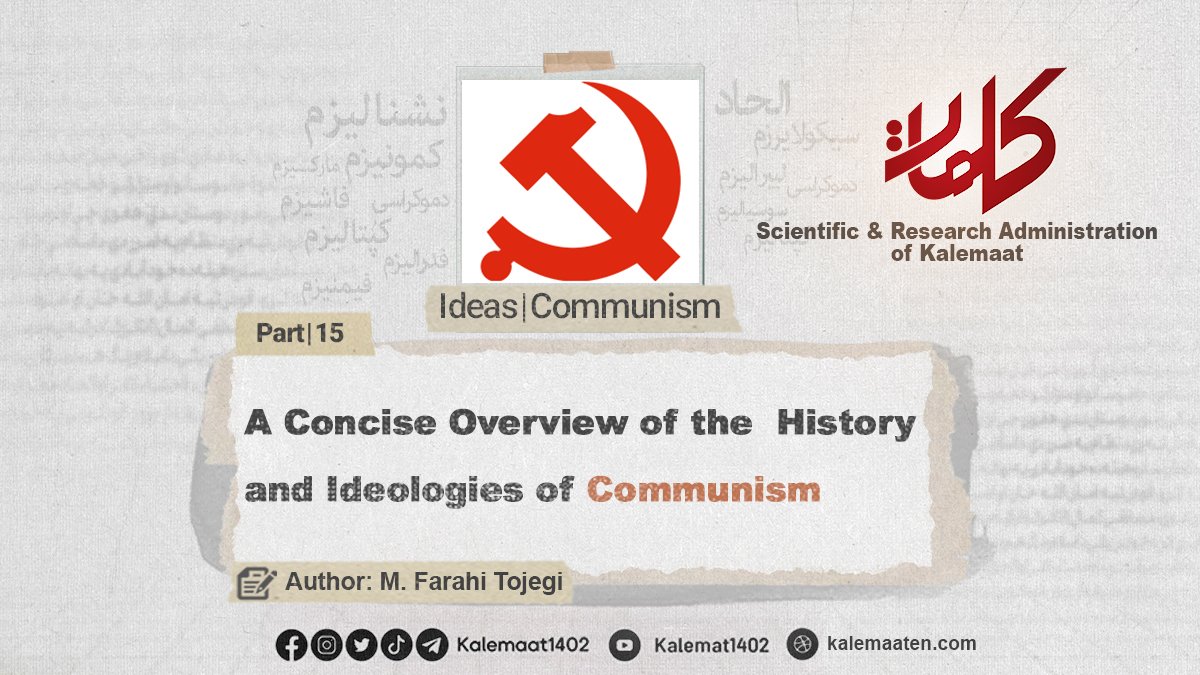Author: M. Farahi Tojegi
A Concise Overview of the History and Ideologies of Communism (Part 15)
The Economic System in Islam
In the previous note, we briefly discussed the economy within the communist system and even touched on the global economic structure. As a starting point for comparison, we also provided a brief overview of the nature and general outline of the economic system in Islam. Now, in this and the following notes, we will explore the various aspects and core structure of the Islamic economic system in more detail and depth, so that its identity becomes fully clear to readers and they come to recognize its superiority and effectiveness compared to other economic models.
The Background of the Economic System in Islam
Before the advent of Islam in the Arabian Peninsula, due to its specific geographical and regional conditions, there was no unified or powerful central government. Only the northern and southern parts enjoyed some commercial prosperity through trade routes. However, after the emergence of Islam and the establishment of the Islamic state by the Prophet Muhammad (peace be upon him), specific laws and regulations were introduced in every aspect of individual life. The Islamic economic system took shape from that very time, was implemented, and functioned as a unified operating framework.
Given that this system consists of numerous components and institutions, this series of notes seeks to examine it—an entity considered one of the most important components of the Islamic governing structure—from both an analytical and historical perspective.
To define an “economic system,” it is first necessary to define the terms “system” and “economy” separately.
System: A set of elements between which there exist—or can exist—relationships, and which has a specific aim or purpose.
Definition of Economy
Among the many definitions of “economy,” the following two are the most widely known and commonly used:
The economy is defined as the set of strategies that balance the unlimited needs of humans with the limited available means.
The economy is the effort to obtain the greatest possible outcome using specific resources—or to achieve a particular goal with the least possible means. In other words, the economy refers to the specific behavior of human beings that involves desire, evaluation, and selection in the fields of production, distribution, and consumption in order to achieve the greatest success.
Based on these definitions of “system” and “economy,” the term economic system can be defined as follows: “An economic system is a structured and organized set of components that function with the goal of evaluating and selecting methods of production, distribution, and consumption to achieve the highest degree of success.” [1]
Another definition states: “An economic system is the method by which a country manages its industrial and commercial units, with particular attention to the nature of ownership of the means of production.” [2]
Definition of Islamic Economy
Muslim scholars and thinkers have offered various definitions of the Islamic economy. Some of these are mentioned below:
Dr. Muhammad Abdullah al-Arabi defines Islamic economics as: “الاقتصاد الإسلامي هو مجموعة الأصول العامة التي نستخرجها من القرآن والسنة النبوية، والبناء الاقتصادي الذي نقيمه على أساس تلك الأصول بحسب كل بيئة وكل عصر” Translation: “The Islamic economy is a collection of general principles extracted from the Qur’an and the Sunnah, upon which we build an economic system tailored to the needs of each society and every era.” [3]
A careful analysis of this definition reveals several key points:
a) A part of the Islamic economy consists of a set of fundamental rules and principles—referred to by the word “الأصول” (principles). These are general and overarching principles rather than specific guidelines. They form the doctrinal foundation or school of Islamic economics, which outlines its theoretical framework. This will be further clarified in future discussions.
b) The second part of the Islamic economy is the economic system itself, referred to by the phrase “البناء الاقتصادي” (economic structure). This aspect pertains to the actual methods and practices a society uses to carry out its daily economic activities. Unlike the doctrinal part, this component is not fixed, but variable, adapting to the needs of each community and era. This part of Islamic economics offers broad scope for ijtihad (independent reasoning) by Muslim scholars and thinkers.
Its main characteristic is flexibility—enabling it to respond to the evolving needs of different times and societies and to meet societal benefits effectively.
Dr. Muhammad Shawqi al-Fanjari, an Egyptian scholar, defines Islamic economics as: “هو ما يوجه النشاط الإقتصادى و ينظمه وفقاً لأصول الإسلام و سياسته الإقتصادية” Translation: “Islamic economics consists of the concepts and rules that guide and regulate economic activity according to the principles and economic policies of Islam.” [4]
This definition also emphasizes the principles and policies of Islam and is consistent with the previous definition. Although other definitions exist, for now, we will suffice with these two.
All the definitions given by Islamic scholars regarding the Islamic economy share a common theme:
Any economic activity or effort by a Muslim must take place within the framework of the principles derived from the sources of Islamic law (Sharia).
Continues…
Previous Part/ Next Part
[1] Economic System, Dr. Hossein Namazi, Shahid Beheshti University Press, pages: 6-12 in brief
[2] Descriptive Dictionary of Economic Terms and Terms, Hassan Golriz, page: 69, Banking Education Center
[3] Mahmoud Al-Khatib: Principles of Islamic Economics
[4] Mahmoud Al-Khatib: Principles of Islamic Economics



